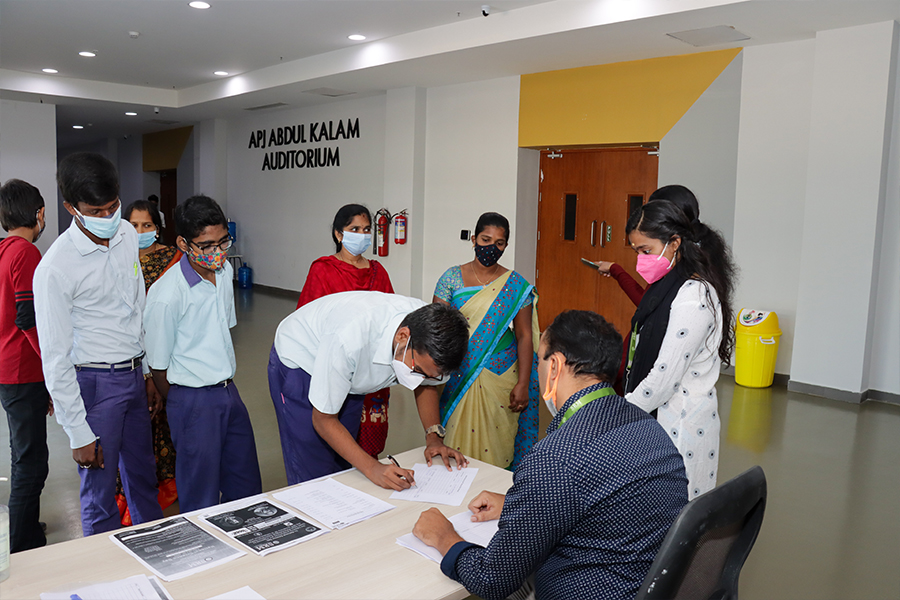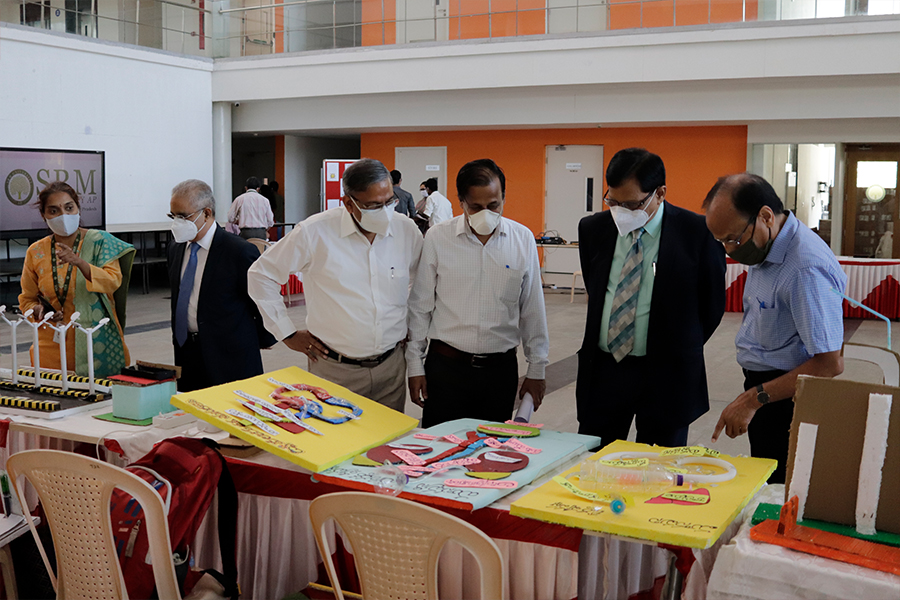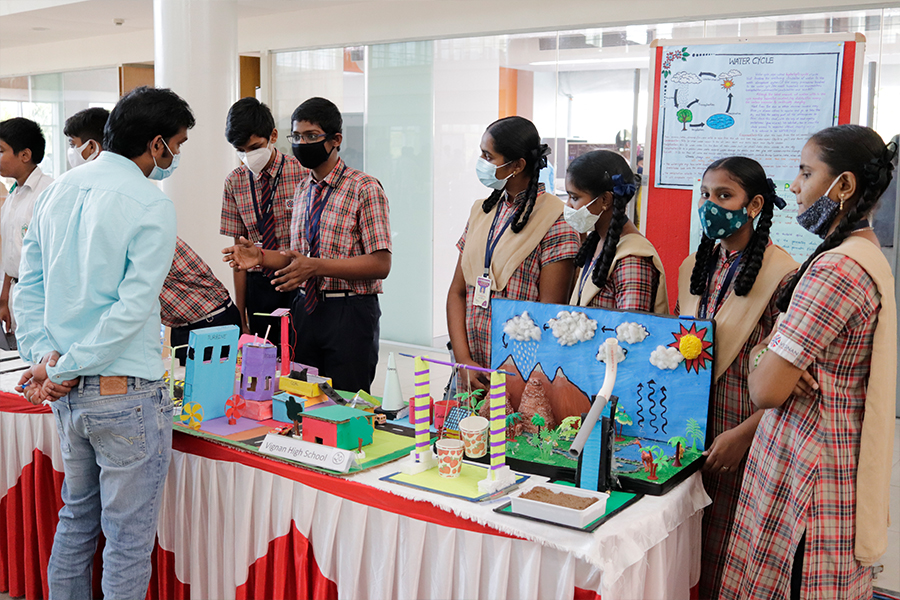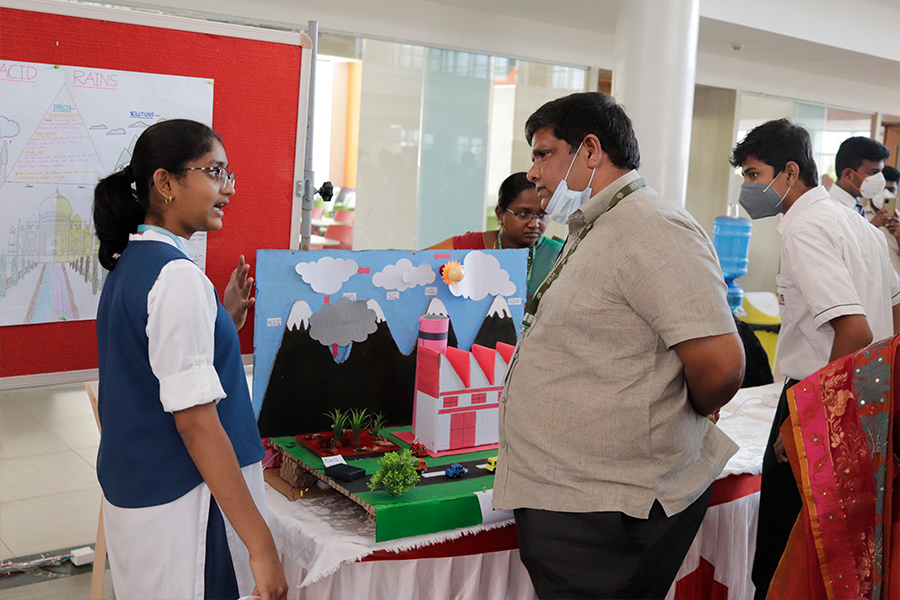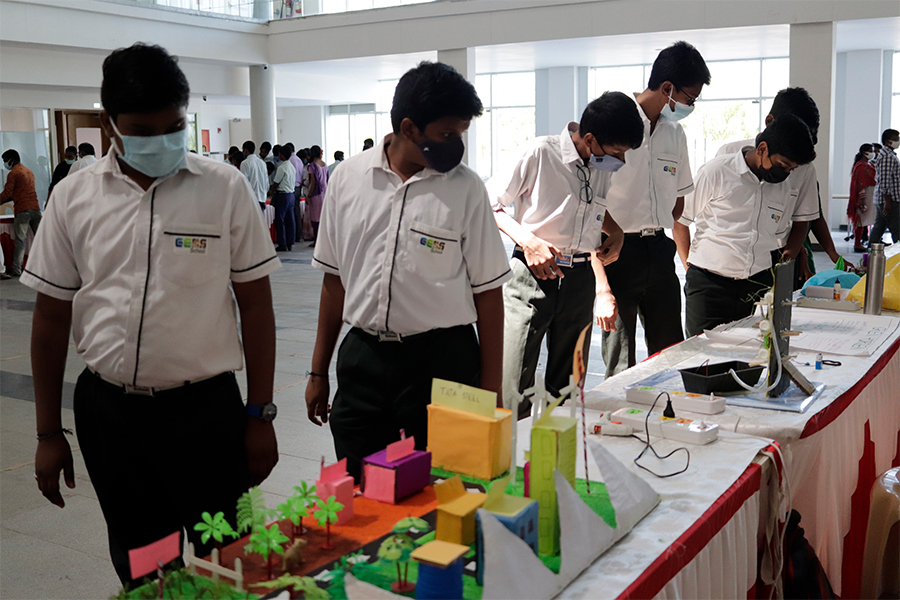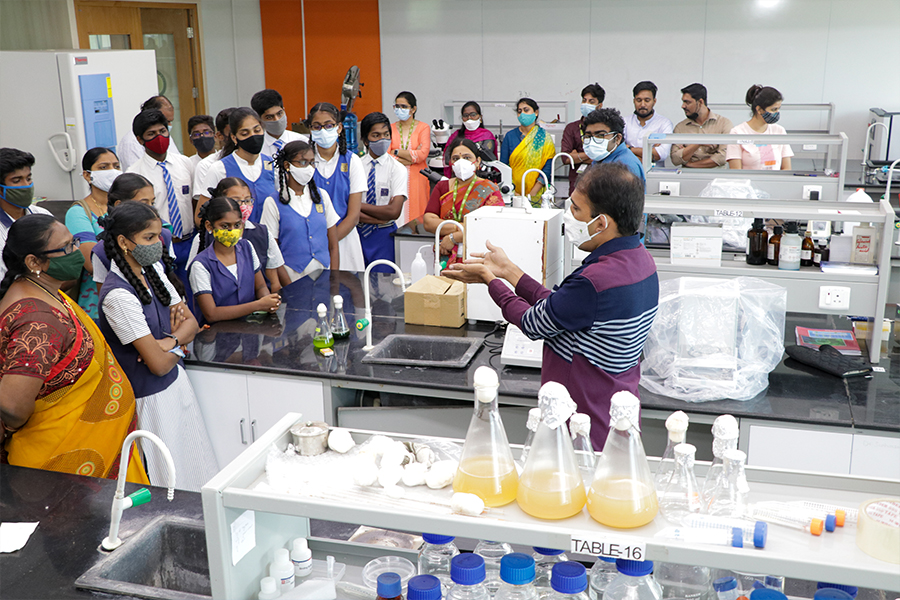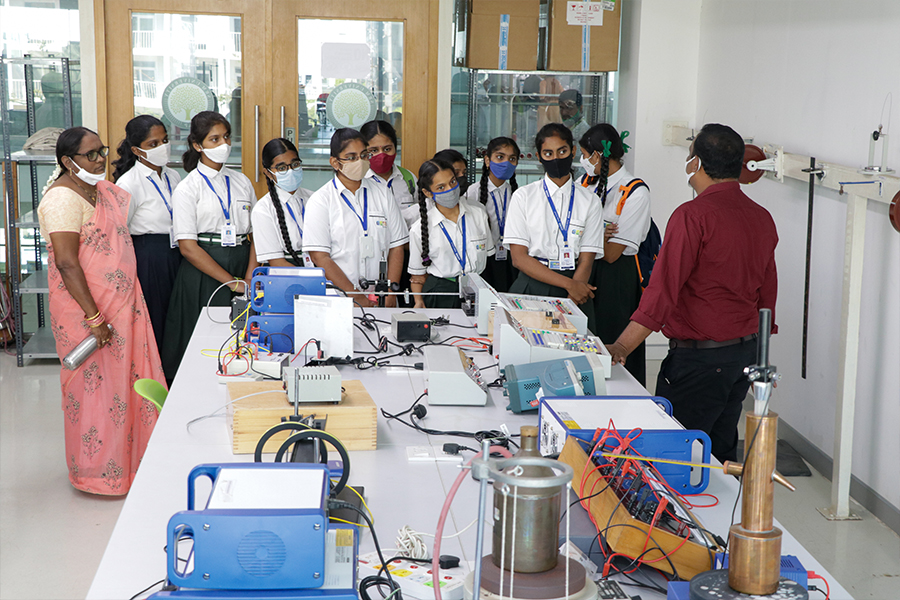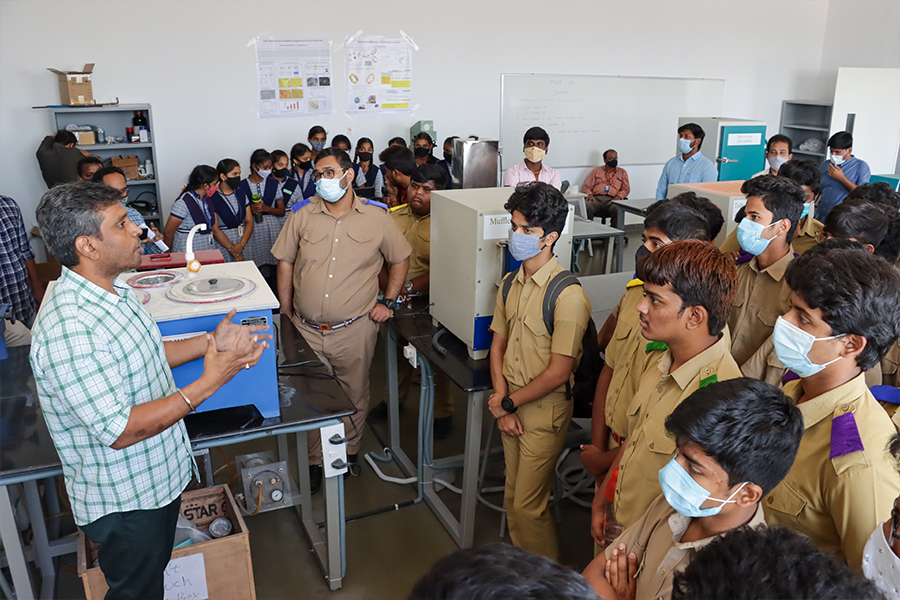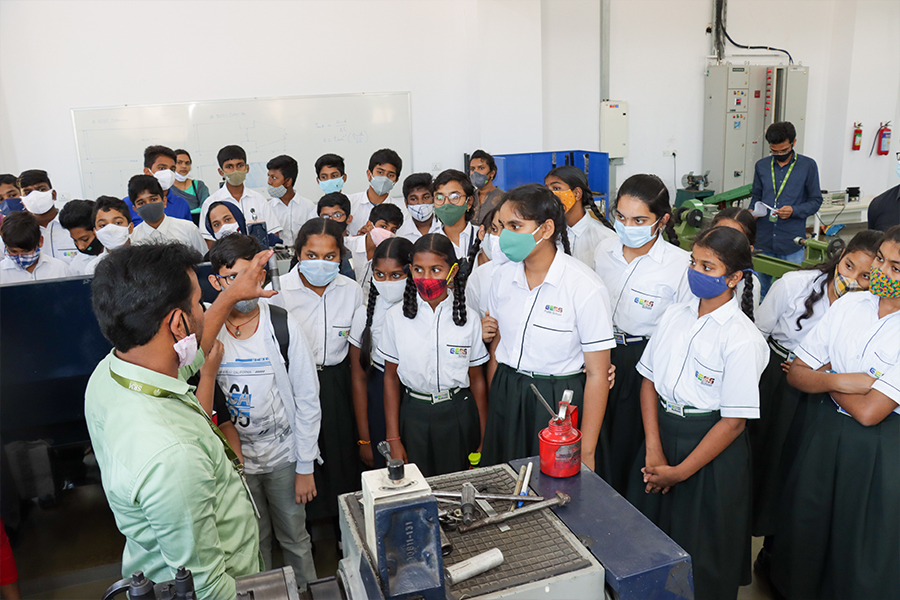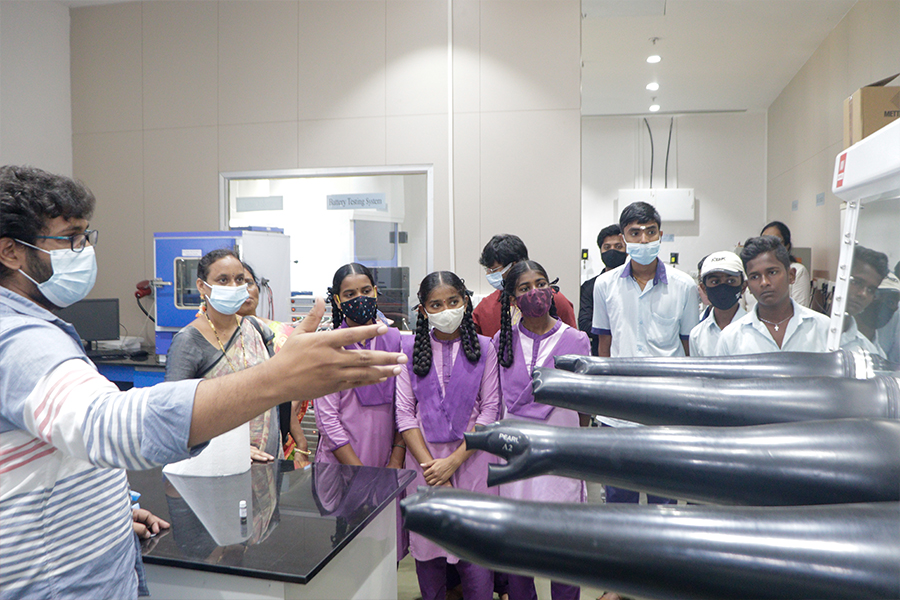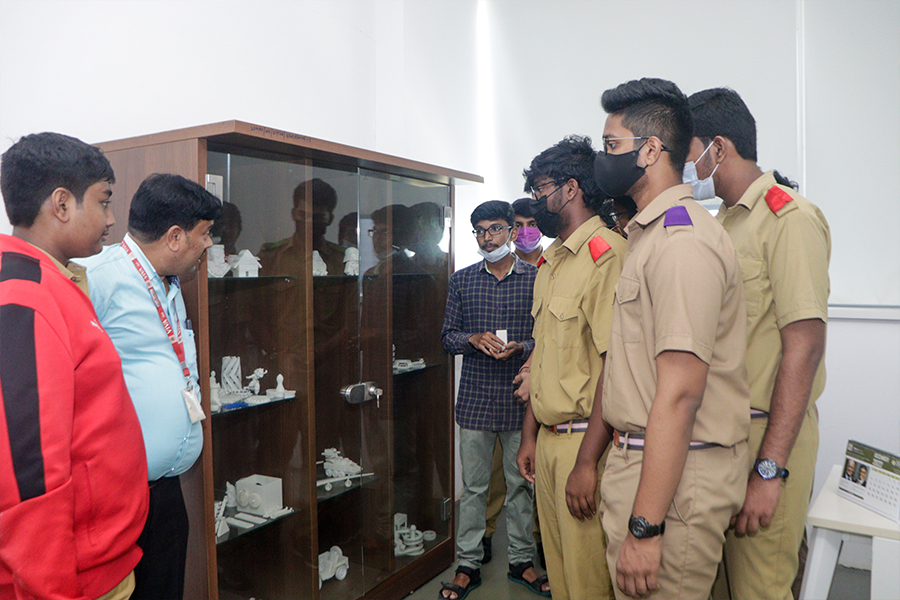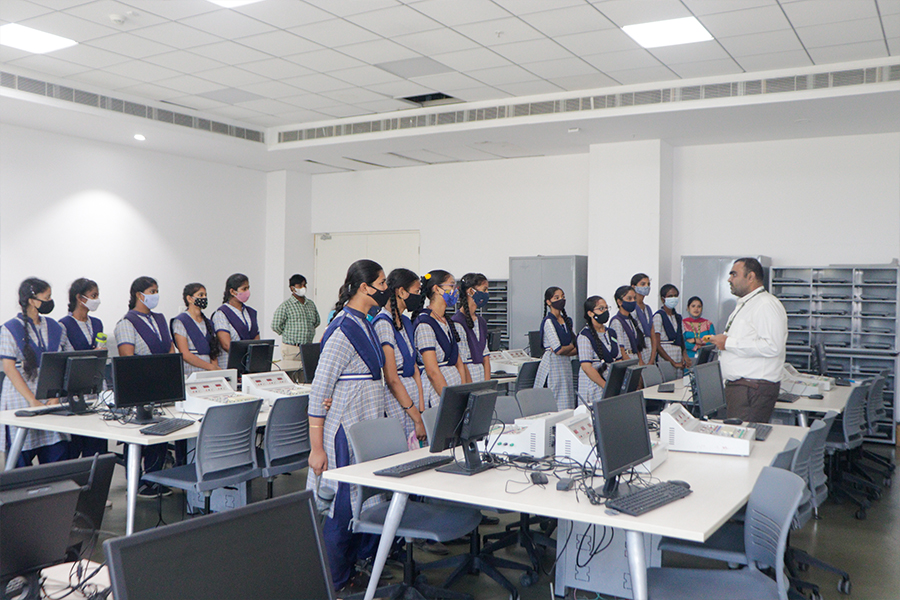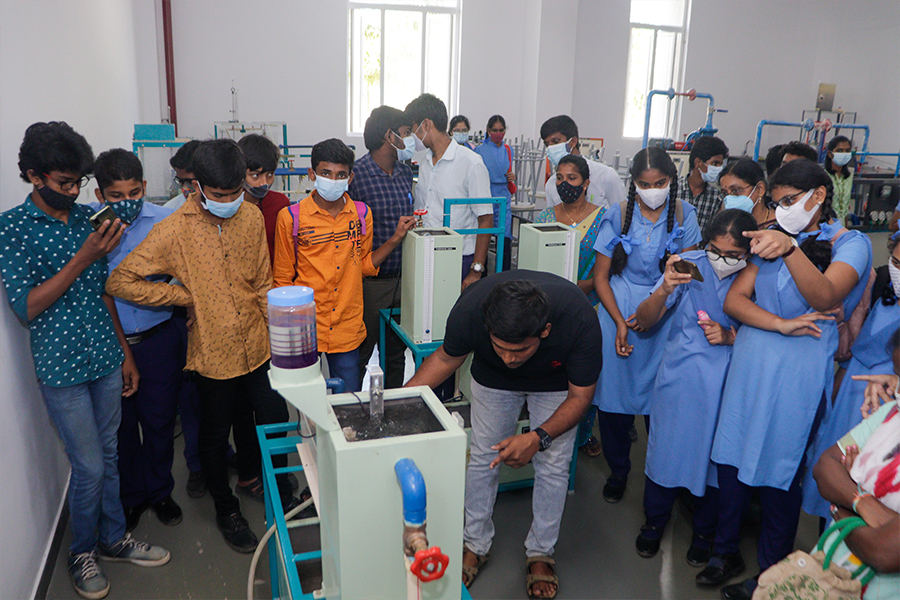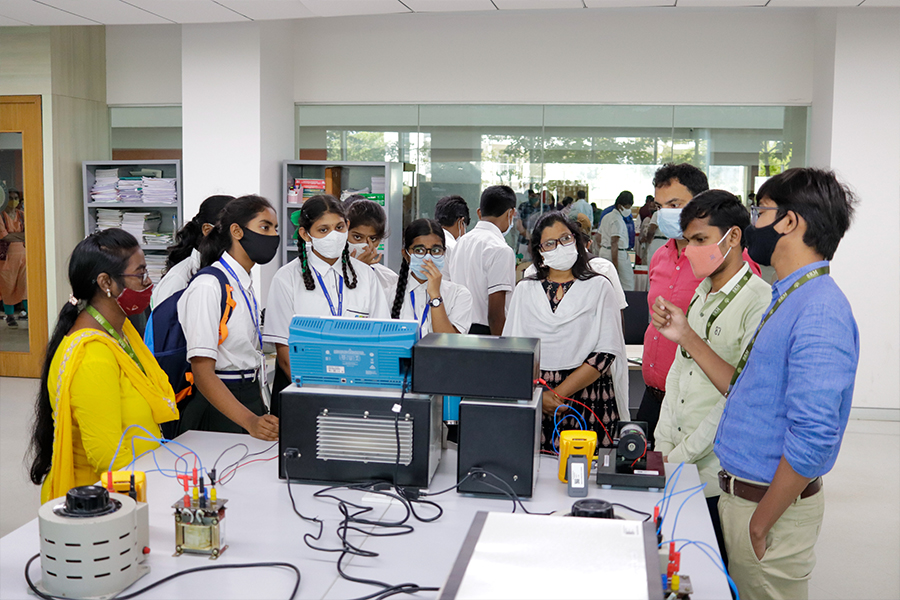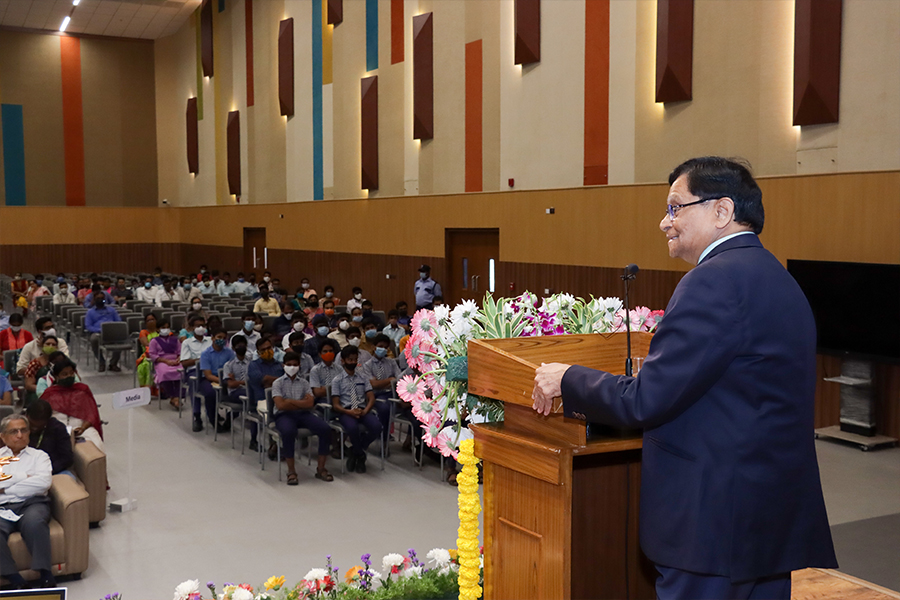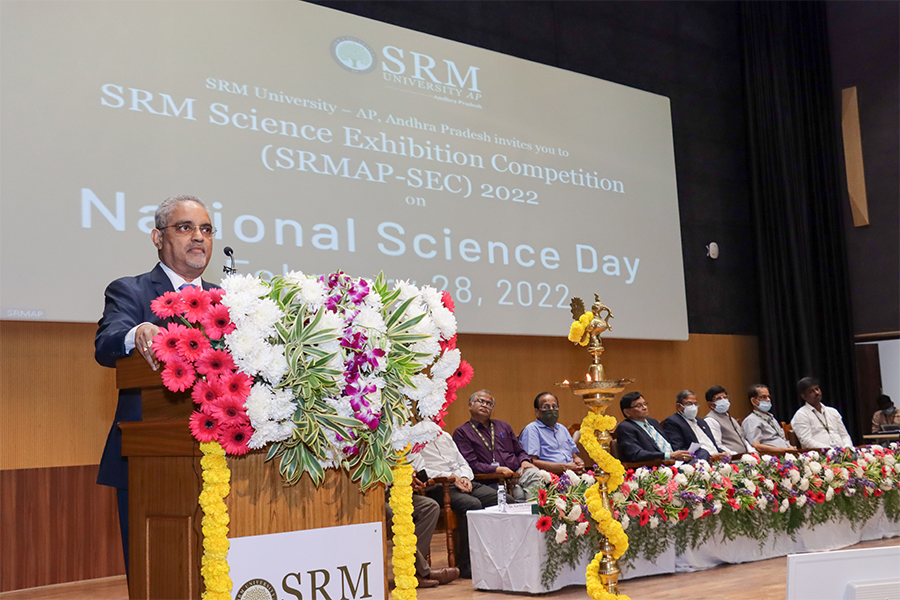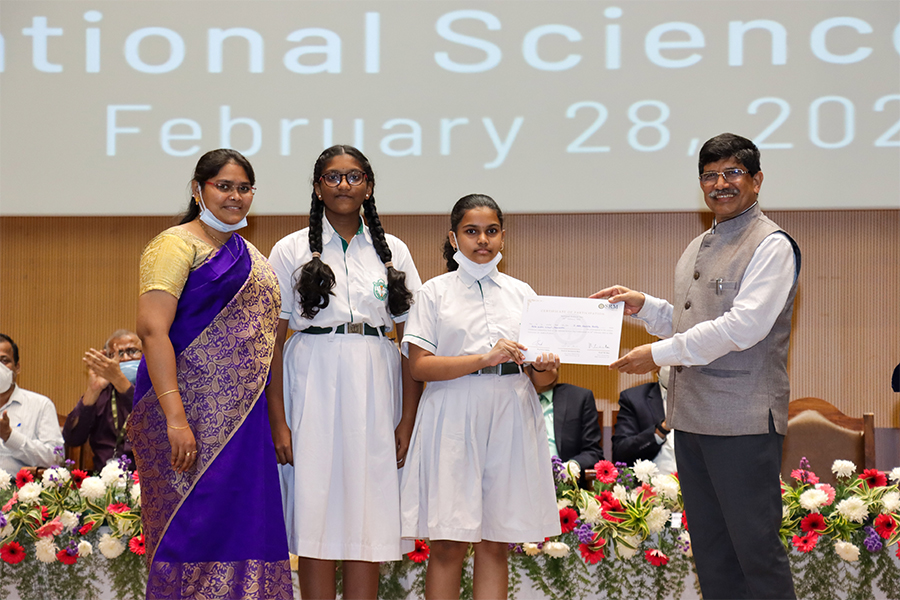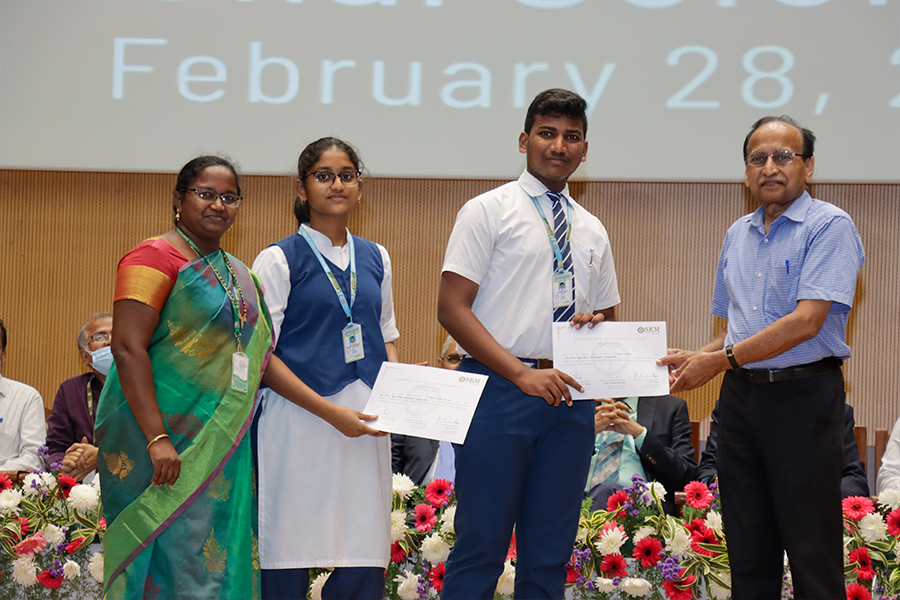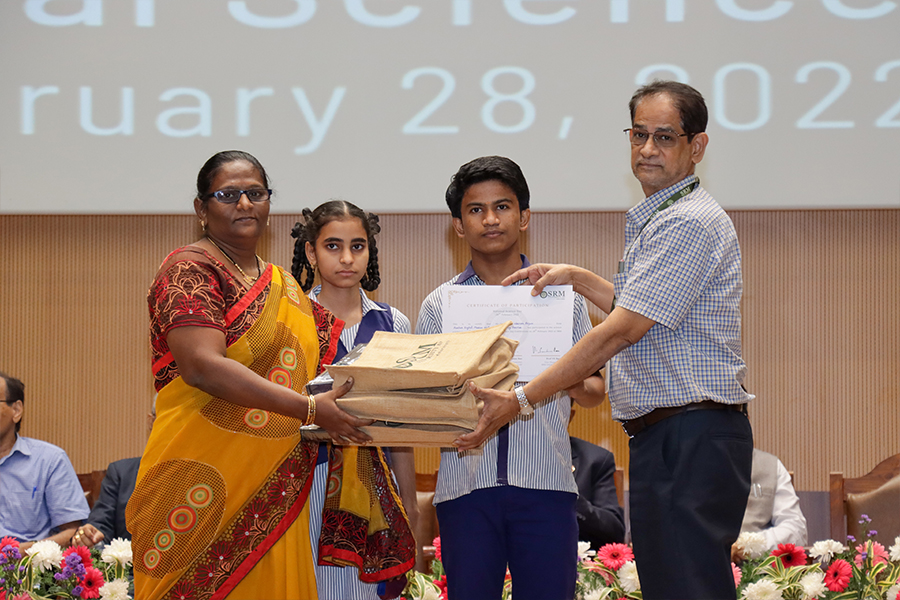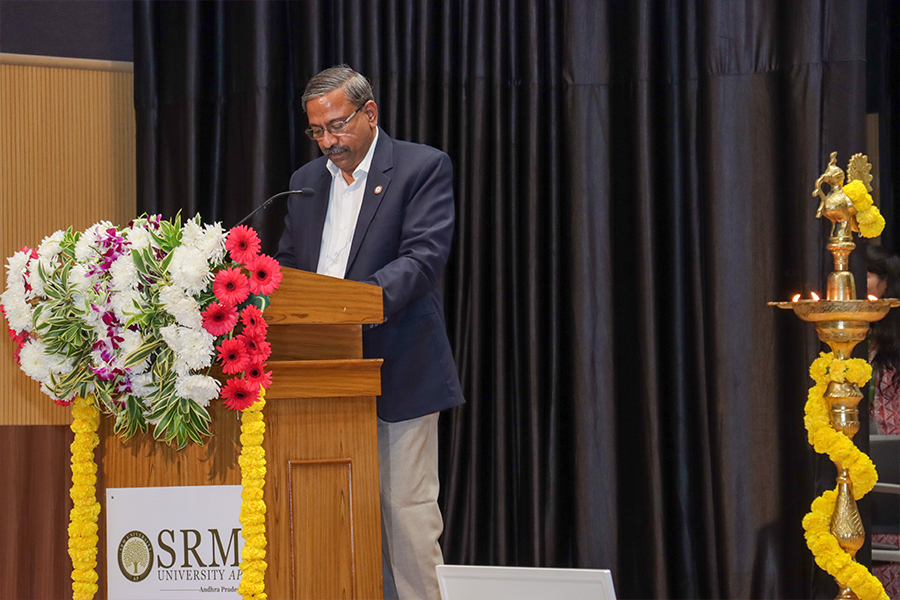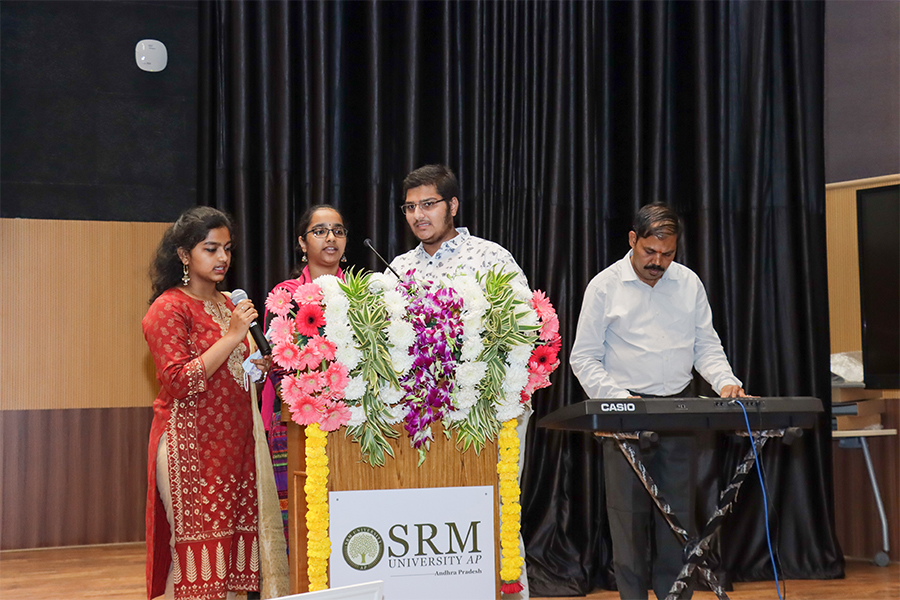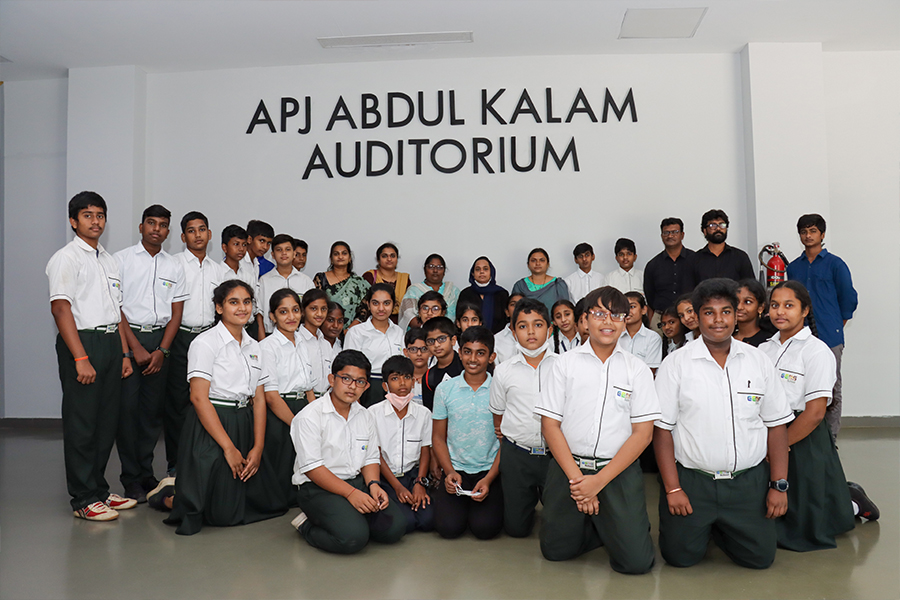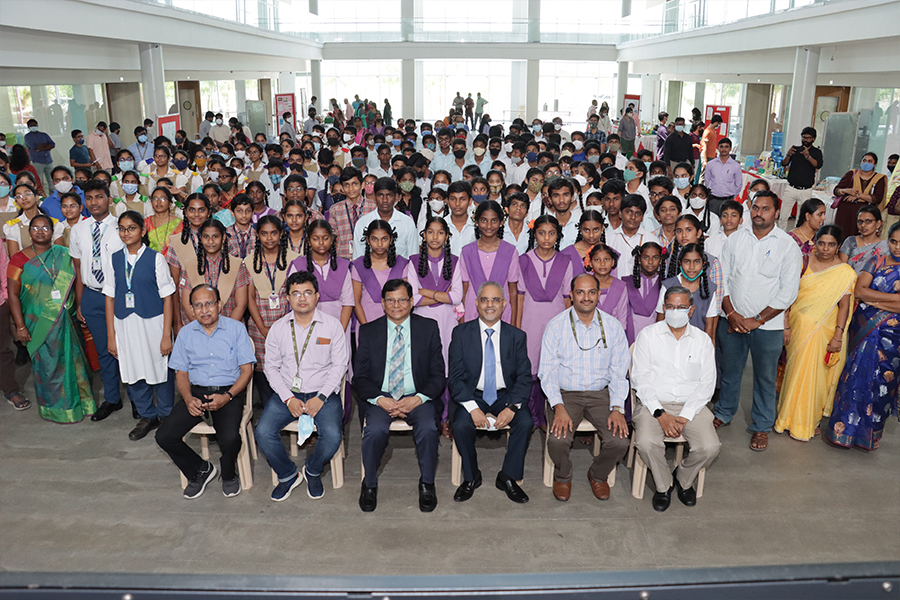SRM-AP All News
ALL News
- An incredible feat of Mechanical Engineering student March 5, 2022
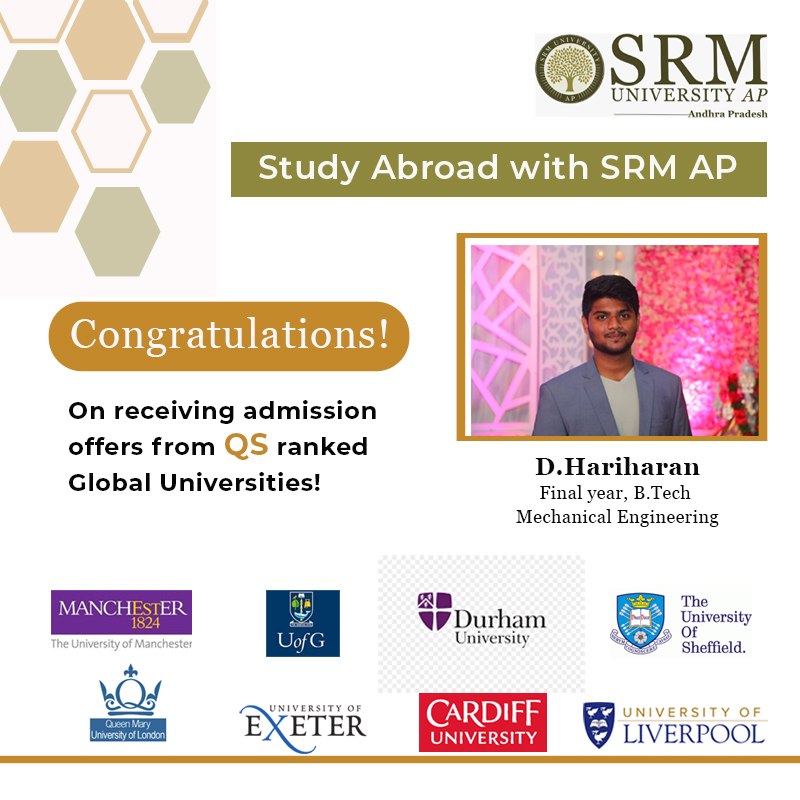
It is a moment of pride and celebration for the Department of Mechanical Engineering at SRM University-AP as Hariharan D, Final year, BTech Mechanical Engineering bags admission offers from multiple top-ranked overseas universities including the University of Manchester that ranks 27 in the QS World University Rankings.
Moulding up the students through the right training and plotting out the right pathway for them to scale further heights have always been the primary objective of the faculty of SRM University-AP. “Happy to hear that you got placed in a core dream company. I hope this will not dampen your aspirations to go for higher studies. Indeed, students like you should study as far as you can. You should bring more laurels to this institution and make us proud”, this was the message Hariharan received from his faculty mentor, Dr Pramod Jammy, which kindled his spirit to set off for higher studies abroad.
“I am ever grateful to my beloved faculty mentors, Dr Pramod Jammy, Dr Lakshmi Sirisha and Dr Surfaraz Halkarni, for their constant support, inspiration and Letter of Recommendations provided amidst their busy schedules. I also thank my Department Head, Dr Prakash Jadhav, for his continuous motivation”, remarked Hariharan.
According to him, creating an imposing CV and impactful SoP is the deciding factor of the application process. He expressed his gratitude to the entire department for their effective involvement in every bit of the application process. “To build an attractive SoP and resounding CV, we need credentials like decent CGPA, involvement in departmental activities such as webinars, internships, workshops, minor projects, software skills, etc. Also, the close association with the department faculties right from the first year is essential to get their affinity and the commendable Letter of Recommendations” he added.
Forging a conducive platform to actualize one’s potential and chase after the life of one’s dreams is what makes SRM University-AP the topmost priority of students. Hariharan has set out an ideal example for many to follow and believe in their dreams coming true with SRM University- AP.
- High-quality perovskite nanocrystals for light-emitting applications March 5, 2022
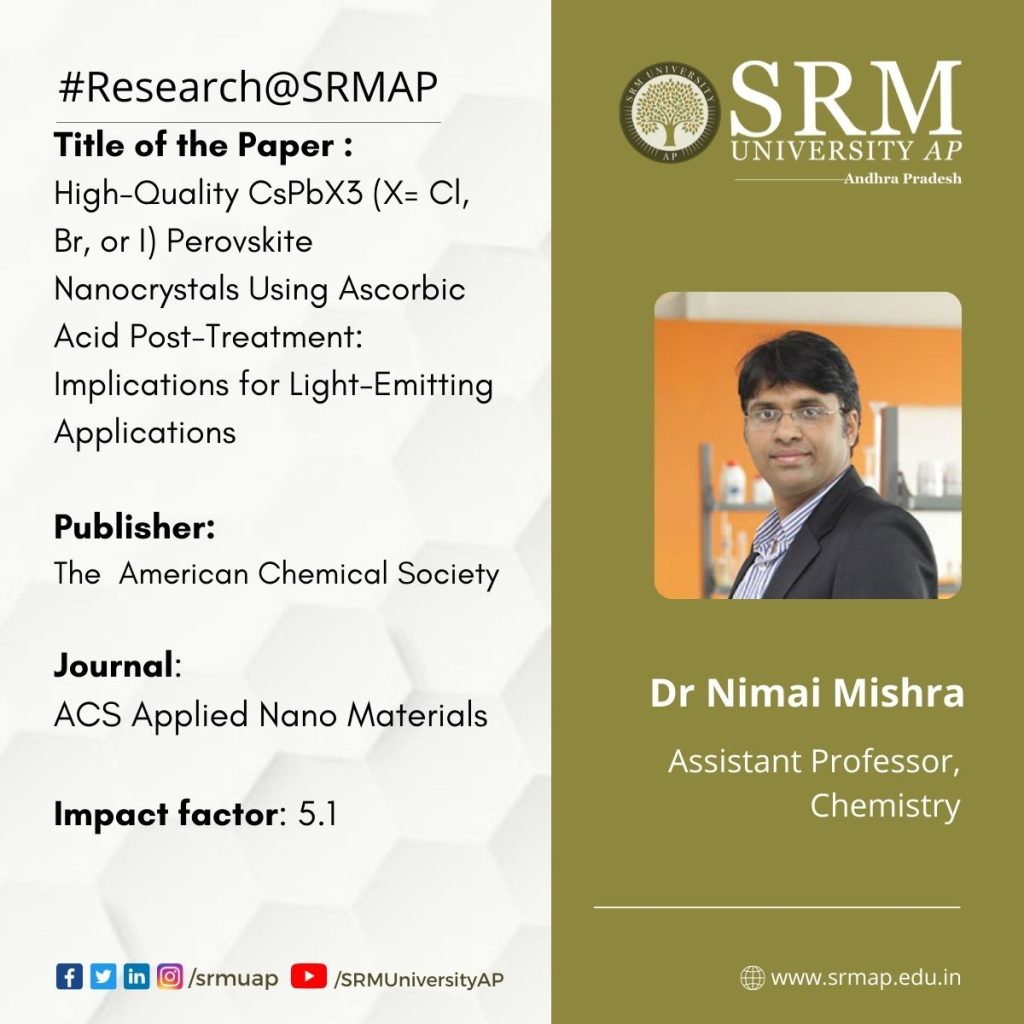 Dr Nimai Mishra, Assistant Professor, Department of Chemistry, SRM University-AP, Andhra Pradesh, along with his research group comprising of students pursuing PhD under his supervision, Ms VG Vasavi Dutt, Mr Syed Akhil, Mr Rahul Singh, and Mr Manoj Paalabathuni have published a research article titled “High-Quality CsPbX3 (X = Cl, Br, or I) Perovskite Nanocrystals Using Ascorbic Acid Post-Treatment: Implications for Light-Emitting Applications” in the Journal “ACS Applied Nano Materials” (published by The American Chemical Society) having an impact factor of ~5.1.
Dr Nimai Mishra, Assistant Professor, Department of Chemistry, SRM University-AP, Andhra Pradesh, along with his research group comprising of students pursuing PhD under his supervision, Ms VG Vasavi Dutt, Mr Syed Akhil, Mr Rahul Singh, and Mr Manoj Paalabathuni have published a research article titled “High-Quality CsPbX3 (X = Cl, Br, or I) Perovskite Nanocrystals Using Ascorbic Acid Post-Treatment: Implications for Light-Emitting Applications” in the Journal “ACS Applied Nano Materials” (published by The American Chemical Society) having an impact factor of ~5.1.Abstract:
Cesium lead halide perovskite nanocrystals (CsPbX3 PNCs) have been the flourishing area of research in the field of photovoltaic and optoelectronic applications because of their excellent optical and electronic properties. However, they suffer from low stability and deterioration of photoluminescence (PL) properties post-synthesis. One of the ways to minimize the surface defects in the surface treatment with suitable ligands is to achieve the PNCs with superior PL properties for light-emitting applications.
In this article, Dr Mishra’s research group addressed the issue of stability in PNCs. We demonstrate to achieve high photoluminescence and stability of CsPbX3 PNCs by incorporating ascorbic acid via post-treatment as a new capping ligand that is abundantly available. Upon addition of ascorbic acid as surface passivation ligand into the oleic acid/oleylamine system to get near-unity photoluminescence quantum yield (PLQY) of CsPbBr3, CsPb(Br/I)3, and for CsPbI3 perovskite NCs. Maintaining stability has become the hotspot of research in this field. Hence, as-a-proof of concept, the stability studies of PNCs in ambient conditions, under continuous UV irradiation, and PL with temperature variations are put forth here. The stability enhancement with post-treatment of ascorbic acid is highly reproducible as we tested for four batches of samples.
Despite the significant advancements of PNCs, there is a challenge afflicting the stability of CsPbI3 PNCs. They are thermodynamically unstable and undergo a non-perovskite phase (δ-phase) transition at room temperature. Many efforts have been reported in the stabilization of iodide perovskite NCs by critically passivating PNCs and applying them for optoelectronics and photovoltaics. On the other hand, mixed halide perovskites like CsPbBrI2 which are relatively stable than CsPbI3 PNCs are a better choice for device applications. But, photo-induced halide segregation is unavoidable which in turn again limit their usage in practical applications. In this manuscript, we demonstrated that the ultra-stable iodide-based PNCs can be achieved by simple and facile surface treatment with ascorbic acid.
The PL intensity of untreated and ascorbic acid-treated PNCs is recorded for 42 days since the date of synthesis. The measurements are carried out for 4 different batches of samples to ensure reproducibility. It is found that the PL intensity is deteriorating rapidly for untreated PNCs while the PL intensity is largely maintained for ascorbic acid treated PNCs. Nearly ̴72% of the initial PL intensity is maintained even after 42 days for the ascorbic acid-treated CsPbBr3 PNCs while the PL intensity is dropped to 24% for untreated PNCs. Ascorbic acid treated CsPbBrI2 PNCs exhibited exceptional ambient stability where ̴69% of the initial PL intensity is maintained after 42 days while the PL of untreated CsPbBrI2 PNCs is degraded rapidly within 2 weeks from the date of synthesis. Moreover, the PL stability of CsPbI3 PNCs is high for ascorbic acid-treated samples even after 55 days while the PL has deteriorated within 4 days for untreated CsPbI3 PNCs. The PL of untreated CsPbI3 PNCs is completely lost in the first 4 hours of UV illumination while ̴ 76.7% remnant PL is observed for ascorbic acid-treated CsPbI3 PNCs. We believe the stabilization of CsPbX3 PNCs of different halide compositions via simple surface treatment with ascorbic acid could form a basis for futuristic light-emitting applications.
Read the full paper: https://pubs.acs.org/doi/full/10.1021/acsanm.1c04312
Continue reading → - SRMAP Scholar wins best oral presentation award in International Conference March 4, 2022
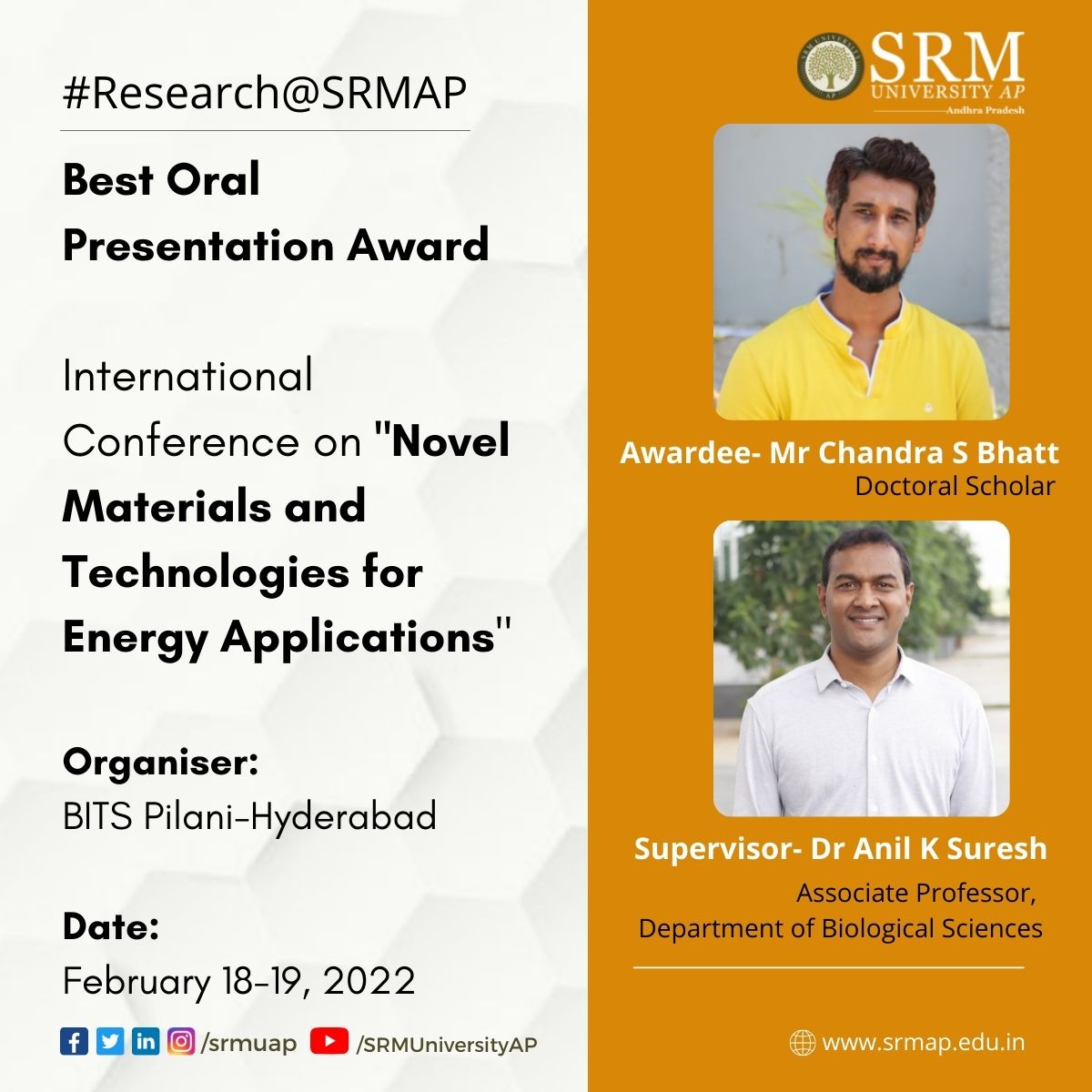 Mr Chandra S Bhatt, a PhD Scholar (CSIR-JRF) working under the guidance of Dr Anil K Suresh, Associate Professor, Department of Biological Sciences, has won the Best Oral Presentation Award at the International Conference on “Novel Materials and Technologies for Energy Applications,” organised by BITS Pilani-Hyderabad, on February 18-19, 2022. Prof Ashutosh Sharma, Former DST Secretary & Institute Chair Professor, IIT Kanpur, was the Chief Guest of the Conference.
Mr Chandra S Bhatt, a PhD Scholar (CSIR-JRF) working under the guidance of Dr Anil K Suresh, Associate Professor, Department of Biological Sciences, has won the Best Oral Presentation Award at the International Conference on “Novel Materials and Technologies for Energy Applications,” organised by BITS Pilani-Hyderabad, on February 18-19, 2022. Prof Ashutosh Sharma, Former DST Secretary & Institute Chair Professor, IIT Kanpur, was the Chief Guest of the Conference.Abstract:
Mr Bhatt’s project aims to develop the best out of waste, which is practically demonstrated by synthesising gold nanostructured eggshell-based supported catalyst. Besides this novel strategy, the megacatalyst is implemented in the real-time degradations of organic and sewage dyes that are harmful to the environment and hydrogenation of nitroarenes at gram-scale (precursors for various pharmaceutical ingredients). Our rationale, naturally created, stable, reusable, hand-removable, resilient catalyst developed from left-over food waste trounces the majority of the existing challenges while utilising nano-based catalysts for heterogeneous catalysis.
With this innovation, Mr Bhatt aims to demonstrate pilot-scale (100-1000 litre) batch catalytic reactions for real-time textile sewage dye detoxification and gram scale hydrogenation of pharma-precursor for the production of acetaminophen, as a step of validation for immediate technology transfer and commercialisation for both environmental remediation and active pharmaceutical ingredients (API’s).
About the Author:
Mr Bhatt aims to continue his scientific career as a prominent scientist in the interdisciplinary area of nano-immunology for cancer theragnostics. Therefore, after the completion of his PhD, he wishes to advance his research career to contribute further to the realm of science upon postdoctoral training from a top-ranking institution abroad.
“It is indeed a moment of pride for me to be awarded the Best Oral Presentation Award in an International Conference organised by BITS Pilani, Hyderabad, winning over 30 participants across the Nation. I express my heartfelt gratitude to my supervisor Dr Anil K Suresh, for his guidance and motivation me throughout the journey,” said Mr Bhatt.
While expressing his joy, Dr Suresh emphatically said, “This was his first oral presentation in an International Conference, and he was conferred with the “Best Oral Presentation” Award. This recognition speaks for Chandra Sekhar’s dedication to his research. He has been working enthusiastically on this project, and I wish that the paper gets published in a high-impact journal which has already been communicated for Shekar’s bright scientific career.”
Continue reading → - Civil engineering student secures admission to multiple universities abroad March 4, 2022
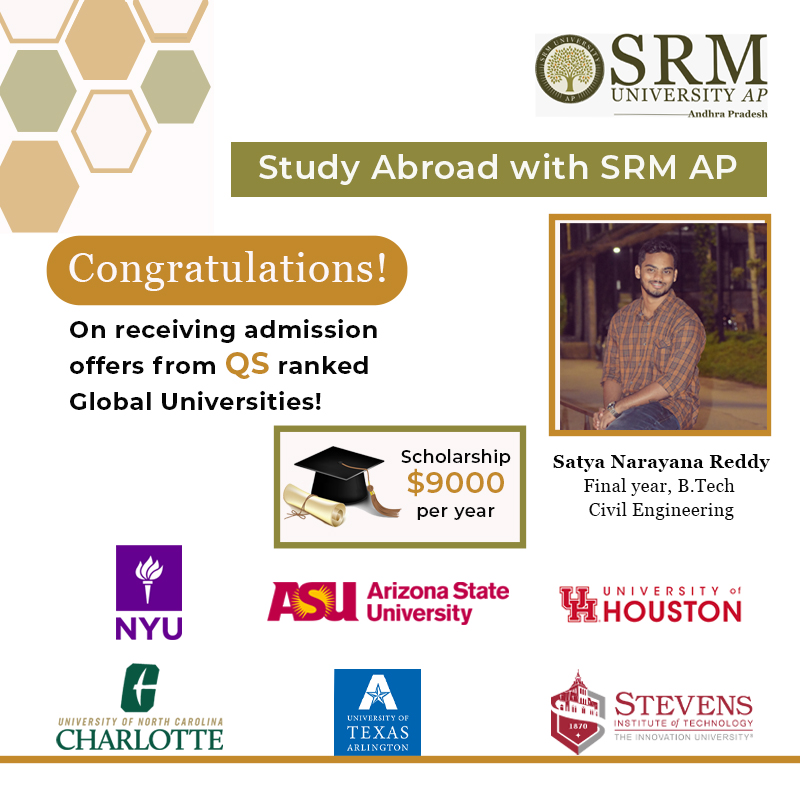 In recent years, the number of Indian students enrolling in colleges abroad has increased. The competition to secure a seat in a world-class university also increases with the number of students aspiring for higher education. The office of International Relations and Higher Studies at SRM University-AP ensures that our students are admitted to QS ranked universities, not just one but many. Satya Narayana Reddy Kovvuri, final year student from the Department of Civil Engineering has received admission offers from New York University, Stevens Institute of Technology, University of North Carolina Charlotte, University of Houston, Arizona State University, and the University of Texas Arlington.
In recent years, the number of Indian students enrolling in colleges abroad has increased. The competition to secure a seat in a world-class university also increases with the number of students aspiring for higher education. The office of International Relations and Higher Studies at SRM University-AP ensures that our students are admitted to QS ranked universities, not just one but many. Satya Narayana Reddy Kovvuri, final year student from the Department of Civil Engineering has received admission offers from New York University, Stevens Institute of Technology, University of North Carolina Charlotte, University of Houston, Arizona State University, and the University of Texas Arlington.Read this exclusive interview with Satya Narayana and get inspired!
How do you feel about the admission offers and the scholarship?
I applied to 9 universities, and I was not confident about the admissions because of the high intake. The first university I got the offer from was Stevens institute of technology. Then I gained confidence that I could make it into my desired university. Later I was overwhelmed by the admits that I secured and even a scholarship to NYU. Among the 9 Universities I applied to, I received admission offers from Stevens Institute of Technology, University of North Carolina Charlotte, New York University, University of Houston, Arizona State University and the University of Texas Arlington. I’m also eagerly waiting to hear from Kent State University, Clemson University and the University of Washington.
Selection process of universities you are admitted to
The Selection process is almost the same for all the universities I applied to. After submitting the application, the documents go for the department (of the selected course) review, and the selection criteria will be based on:
- Good GRE and English Proficiency test score(IELTS/TOEFL/DUOLINGO)
- A good CGPA with no backlogs.
- An efficient SOP that describes your qualities, achievements and skills.
- Strong LORs from professors.
- Research Papers / Publications(if any)
Within two months, the universities will inform us of the decision and the details of the scholarship if we are qualified. I have received a scholarship of $9000 per year from New York University, which is ranked 42 in the QS global ranking.
About the course that you have decided to enrol in
The course that I have decided to pursue is an MS in Construction Management. As I am keenly interested in the construction sector and my bachelor’s degree is in Civil Engineering, I decided to gain more knowledge and experience in the same field. The opportunity to study Construction Management course is my dream come true.
Support from SRM AP (Faculty, mentors etc.)
Dr Uma Maheshwar Arepalli, Assistant Professor in the Department of Civil Engineering is specialised in Transportation Engineering. He provided me with a few insights about courses and the colleges which are suitable for my specialisation. It helped me clear my confusion while I was applying for universities. Dr Bhagath Singh, Head of the Civil Engineering department, also guided me in this process. I followed his instructions on how to apply to universities abroad. The Academic affairs department also helped me by providing transcripts and certificates as soon as I approached them so that there is no delay in my application process.
Your message to junior batches
I advise my juniors to start the process as early as possible. Score high in the GRE (310 -325) and IELTS (6.5 – 8)tests. Search for the universities that provide the best coursework for your desired branch. Also, keep in mind the states you choose in the US provide job opportunities after you complete graduation. Lastly, choose the better states by thinking about living expenses and weather conditions. Check for the requirements of your targetted universities beforehand and draft an excellent personal statement. Submit the applications before priority deadlines as it is crucial to secure scholarships. Check for regular updates in the mail and also in the university application portal.
- AI to boost up the performance of bioelectrochemical systems March 3, 2022
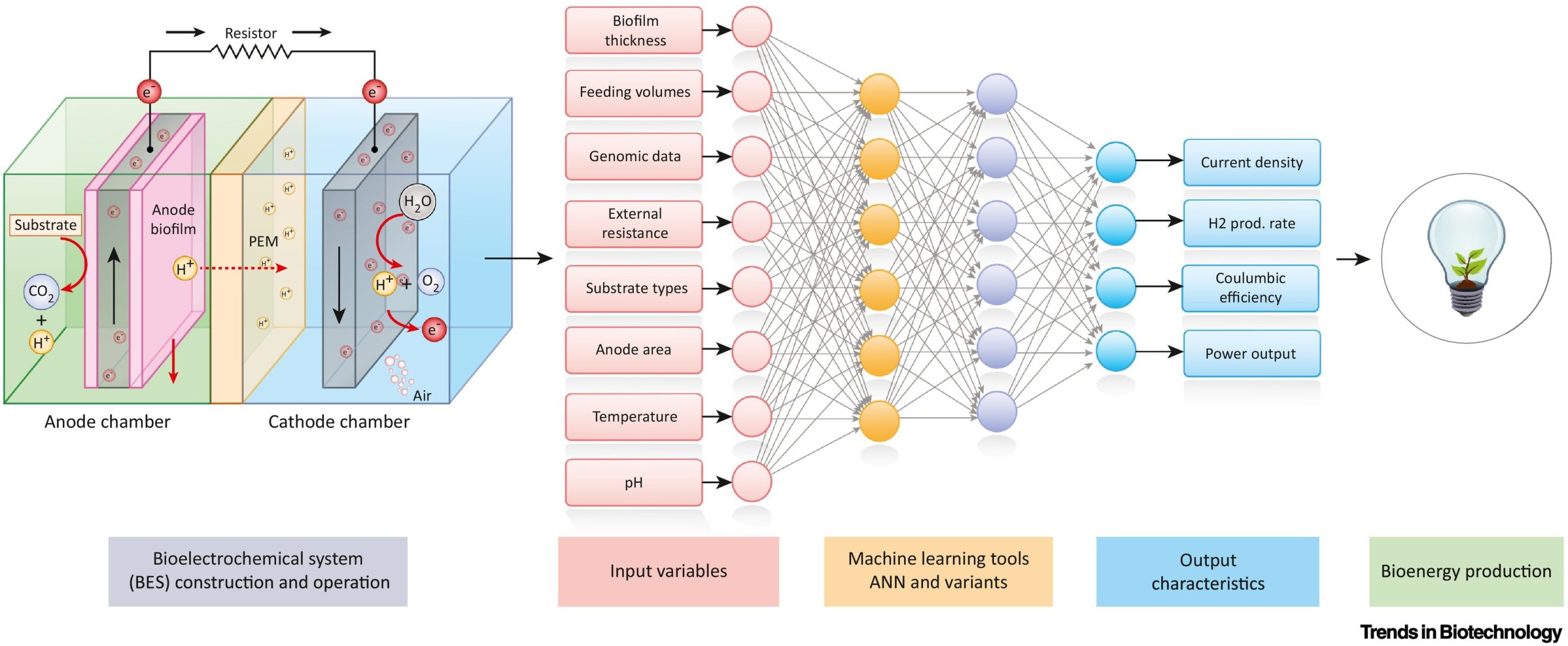
The Department of Environmental Science is glad to announce that Dr Lakhveer Singh has published his paper titled, “Leveraging artificial intelligence in bioelectrochemical systems” in a prestigious journal Trends in Biotechnology with a high Impact Factor of 19.53.
The paper was published in collaboration with Baptist University, Hong Kong and Oregon State University, USA.
Abstract of the Research
Bioelectrochemical systems (BESs) are highly evolved and sophisticated systems that produce bioenergy via exoelectrogenic microbes. Artificial intelligence (AI) helps to understand, relate, model, and predict both process parameters and microbial diversity, resulting in higher performance. This approach has revolutionised BESs through highly advanced computational algorithms that best suit the systems’ architecture for suitable fuel production.
About the Research
The performance of the microbial reactors primarily depends on the activity of the biocatalysts, indirectly governed by the microbial community structure and function. In this context, microbial dynamics are crucial for performance consistency and are sensitive to both biotic and abiotic stress in the reactor. To address this, a comprehensive, mechanistic understanding of the community dynamics is essential. Understanding the metabolic and electrochemical potentials would provide a basis for the selection and control of efficient communities with ramped metabolic flux and boosted electrogenic activity. The research will help in the development of an improved system for green fuel production.
According to Dr Lakhveer Singh and his collaborators, Artificial Neural Networks (ANNs) and Adaptive Neuro-fuzzy Systems (ANFISs), backed with iterative and backpropagation abilities, can be applied to Microbial Fuel Cells (MFCs) with improved computational models. This will eventually provide a breakthrough in operational and translational research predicting newer parameters, such as predictions of the emergence of substrate-specific microbial communities in biosensors or bioreactors. They intend to work on this in future.
- National Science Day: Enkindling scientific spirit in young minds March 2, 2022
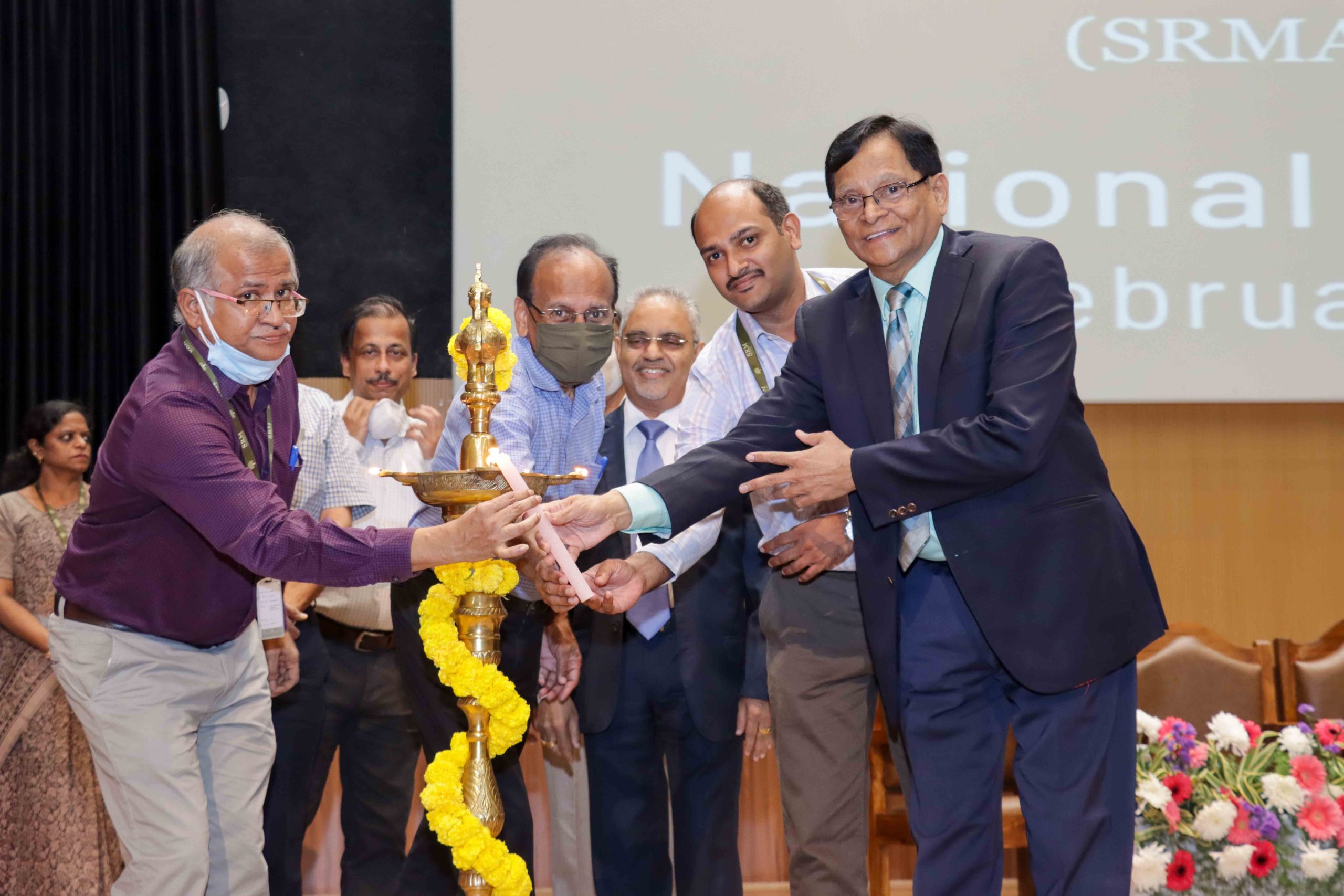
Every year National Science Day is celebrated across the nation to commemorate the discovery of the Raman Effect by Indian physicist Sir CV Raman, a milestone in the realm of science that won him the Nobel Prize. SRM University-AP, a pioneering multi-stream research institution has also celebrated the occasion of National Science Day on February 28, 2022, with immense pride, and paid homage to the pre-eminent scientist.
The event was celebrated in collaboration with South Asian Meteorological Association (SAMA) under the 2022 theme ‘Integrated Approach in Science and Technology for a Sustainable Future’ to exploit the burgeoning possibilities in the scientific domain for a healthy and prosperous future. Distinctive talks on the works of Nobel laureates of Physics, 2021 by notable scholars, Prof. T. Yasunari, Advisor, RIHN KCCAC, Japan and Prof. Krishna Achuta Rao, Head, CAS, IIT-Delhi were also arranged to shed light on the latest research practices and developments.
The inaugural address was delivered by Prof. V.S. Rao, Vice-Chancellor. He appreciated the students for their enormous participation in the activities organised as part of the celebration, and for rightly articulating the significance of the focal theme through their representations. “There cannot be a better example than the pandemic which demonstrated the integration of science and technology” he asserted. He also recollected the invaluable contributions of Indian scholars like Dr Jagadish Chandra Bose, Srinivasa Ramanujan, Homi J Bhabha and Vikram Sarabhai who transformed the scientific outlook of the country.
Prof. BV Babu, Dean of School of Engineering and Sciences addressed the gathering and briefed about the relevance of taking science and technology together towards a sustainable future. He emphasized the relevance of non-conventional sources of energy in the times ahead and the social benefits associated with them. He further elaborated on the concept of digital lean solutions and their impact on our lives.
Prof. D Narayana Rao, Pro Vice-Chancellor presided over and expressed concern over the inescapable repercussions of climate change and ruthless exploitation of nature. He also recognised the pivotal role SRM University-AP continues to play in creating talents and masterminds through intensive research practices and exposure to global technological facilities.
Prof. Someshwar Das, Convenor SAMA introduced the organisation, South Asian Meteorological Association and briefed about the numerous remarkable activities it carried out since its inception. He also highlighted various plans the organization intends to execute in future.
Further, there were talks on the works of Nobel Laureates 2021. Prof. T. Yasunari explicated the major works of the Nobel Laureate Prof. Syukuro Manabe and reiterated Manabe’s philosophy of ‘Simplicity and Balance’ in Climate Modelling. Prof. Krishna Achuta Rao threw light into the Stochastic Climate model, the innovation of another Nobel winner, Klaus Hasselman. A question-answer session was also organised with both the speakers for the students to gain insight into global scientific developments.
An array of programmes including science exhibition, laboratory visit, and quiz competition was also organised as part of the science day celebrations. Nearly 400 students from around 20 schools in and around the city of Guntur and Vijayawada actively participated in the events and expressed their inquisitive spirit and passion for science.
Awards and certificates were distributed to the winners and all other participants by the dignitaries. Students who have come up with innovatory models such as bluetooth car, human rescue detection system and many more were specially acknowledged and given mementoes. Dr Premkumar, Registrar proposed the vote of thanks and expressed his gratitude to everyone, especially the students for their enthusiastic participation.
The programme was made a huge success with the active and timely coordination of the organising committee, effective participation of the students and cooperation of every supporting staff and student at the university. SRM University-AP surges ahead as a revolutionary institute in research and developments and intends to disseminate scientific temper among the students to make phenomenal contributions to the world of science.
- SRM University-AP launches Aadigyan: To promote India’s cultural knowledge tradition February 26, 2022
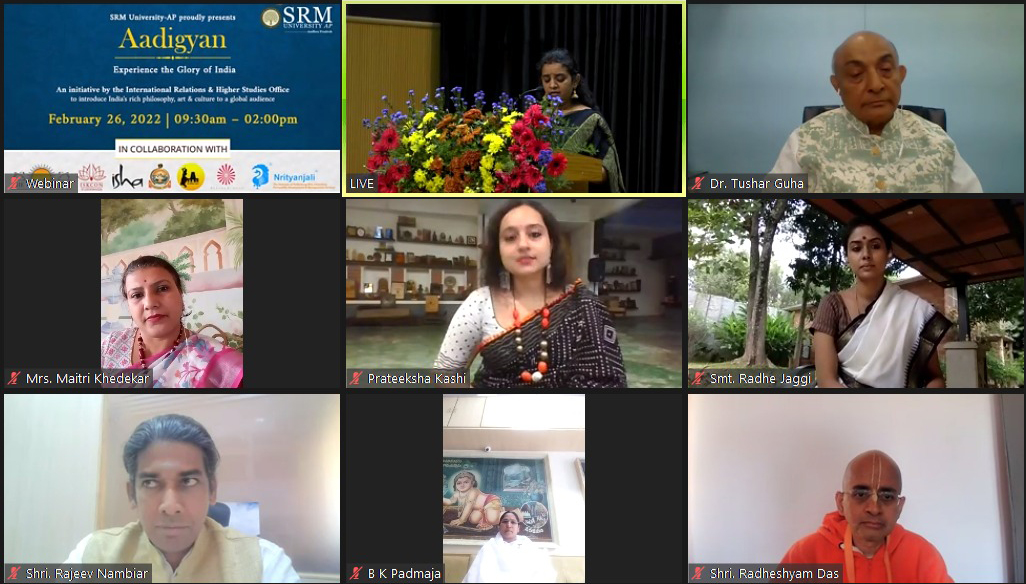 Special invitees shower wishes to the initiative
Special invitees shower wishes to the initiativeAadigyan, the flagship initiative of the International Relations and Higher Studies office at SRM University-AP, has been launched in a grand ceremony held at the auditorium in hybrid mode on February 26, 2022. Chief guest Shri G Kishan Reddy, Minister of Tourism, Culture, and Development of the North Eastern Region of India, shared the message that it is heartening to launch Aadigyan, which embarks the beginning of sharing Indian values, culture, heritage and art to a global level. “I wish Aadigyan a grand success and congratulate SRM University-AP for providing this wonderful opportunity to the world”, he added.
Prof V S Rao, the Vice-Chancellor, launched the promo video of Aadigyan and remarked that Aadigyan aims to integrate education with the art and culture of India. Dr Naga Swetha Pasupuleti, Associate Director – International Relations and Higher Studies, introduced the partnering institutions- ISKCON; The Art of Living; The Temple Dance; Nrityanjali; Isha Foundation; Rajyoga Education & Research Foundation, Brahma Kumaris; and Vivekananda Institute of Human Excellence, Ramakrishna Math, Hyderabad.
Introducing the Project Samskriti to the students of SRM AP, Smt Radhe Jaggi from Isha Foundation highlighted the need to nurture, conserve, and expose the majesty of traditional Indian arts when these art forms are being practised as hobbies.
As an alumnus of SRM, Shri Radheshyam Das, Founding Director of VOICE (Vedic Oasis for Inspiration Culture and Education), and President of ISKCON, Pune, appreciated the efforts of SRM AP to gear education towards human-making rather than money-making.
“Dance goes beyond the realm of physical reality. Indian dance forms are widely used for therapeutic purposes” highlighted Prateeksha Kashi, Indian Kuchipudi Dancer & Actress. Smt. Himansee Katragadda, Founder – The Temple Dance, further shared her happiness to offer Kuchipudi dance courses to the students of SRM AP.
Smt. BK Shivani, renowned Motivational Speaker & Spiritual Teacher from Brahma Kumaris elucidated the need for living in the fundamental equations of life. Brahma Kumaris will be offering courses on value education and holistic health as a part of Aadigyan.
“Let us not forget the identity and dignity of our own culture and traditions”, said Dr Tushar Guha, Founder & Chairman, Nrityanjali Group, while expressing his pleasure to partner with SRM AP. “Diversity is the basis of existence, and India celebrates diversity”, added Shri. Rajeev Nambiar, Director – Institutional Programs/National Teachers Coordination, The Art of Living.
Other special invitees who graced the virtual ceremony with their inspiring words include Dr Rewant Vikram Singh, Diplomat – High Commission of India, Srilanka; Ms Goli Gabby, Health and Wellness Coach and Educator; Swami Bodhamayananda, R K Math; and Ms Jennifer Mawulolo Ami Ametewee First Secretary – Trade, Tourism & Culture Officer High Commission of India, Ghana.
The event witnessed several cultural performances by the students of SRM University-AP. Ms Revathi Balakrishnan, Assistant Director- Student Affairs, thanked all the distinguished invitees and audience who joined the virtual inaugural ceremony of Aadigyan.
Continue reading → - French Delegation in SRM University-AP discusses prospects of academic collaboration February 26, 2022
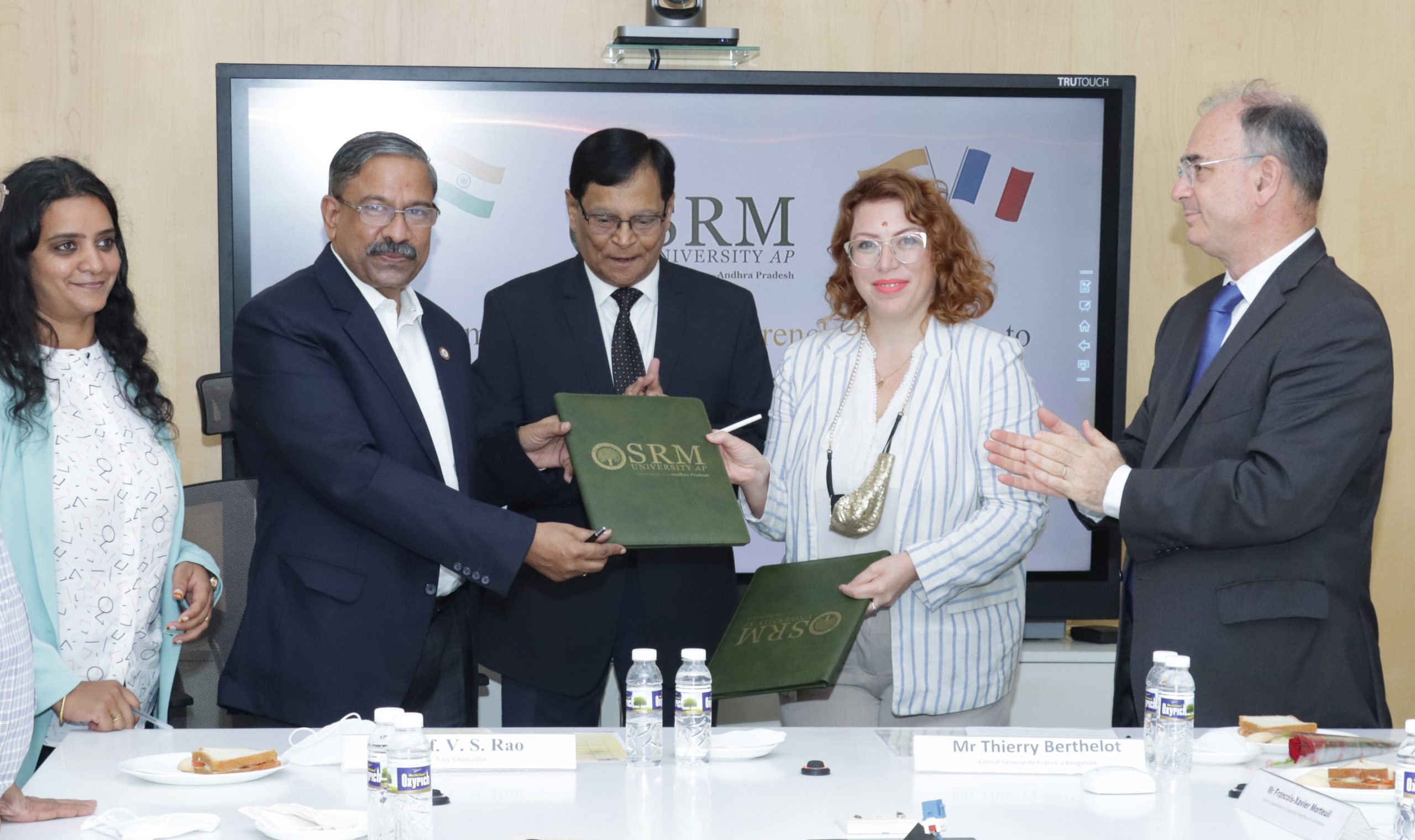 MoU inked with Rennes School of Business
MoU inked with Rennes School of BusinessAs part of an official visit to Andhra Pradesh, members of the French Delegation visited the SRM University-AP campus on Friday, 25 February 2022. An MoU has been signed between Rennes School of Business, France and SRM University-AP on student exchange, curriculum development, and articulation programmes. University Vice-Chancellor Prof V S Rao called the MoU “an important milestone for SRM AP” and welcomed students from France to India.
Mr Thierry Berthelot, Consul General de France a Bangalore, reaffirmed the MoU between India and France in the number and quality of student exchanges. “We have reached the aim of 10,000 Indian students by 2020; now, we look forward to increasing the number of Indian students in France significantly to 20,000 by 2025”, he added. The signing of the agreement for the mutual recognition of degrees will facilitate the pursuit of higher education by Indian students in France and French students in India and enhance their employability. The delegation emphasised that the collaboration with Rennes School of Business will further equip students of SRM University-AP to gain professional experience and job opportunities around the world. Mrs Maud LE BARS, South Asia Area Manager Rennes School of Business and Conseillere du Commerce Exterieur de la France, highlighted the student and faculty diversity in France that surpasses language barriers.
Consequently, Dr Naga Swetha Pasupuleti, Associate Director – International Relations and Higher Studies, talked about the strong partnerships SRM AP holds with QS ranked global universities and especially EFREI, France. The delegation interacted with the students and faculty members of SRM University-AP and discussed various possibilities of international internships and study abroad opportunities.
Mr Francois-Xavier Morteuil, Attache Consulaire pour la Coopération Scientifique et Universitaire; Mrs Ambika Anilkumar, Deputy to Attache Consulaire; Mrs Vasudha Murlikrishna, Campus France Manager Hyderabad; Mrs Vidya Suresh, Country Manager ESIGELEC (engineering school in France); and Mr Samuel Berthet, Director of Alliance Francaise of Hyderabad were part of the delegation and explored the university campus.
Pro-Vice-Chancellor Prof D Narayana Rao, Registrar Dr R Premkumar, Deans and Associate Deans of all schools were present in the discussion pertaining to the future scope of collaborations with French academic institutions.
Continue reading → - Pursue Your Dream of Overseas Education with SRMAP February 25, 2022
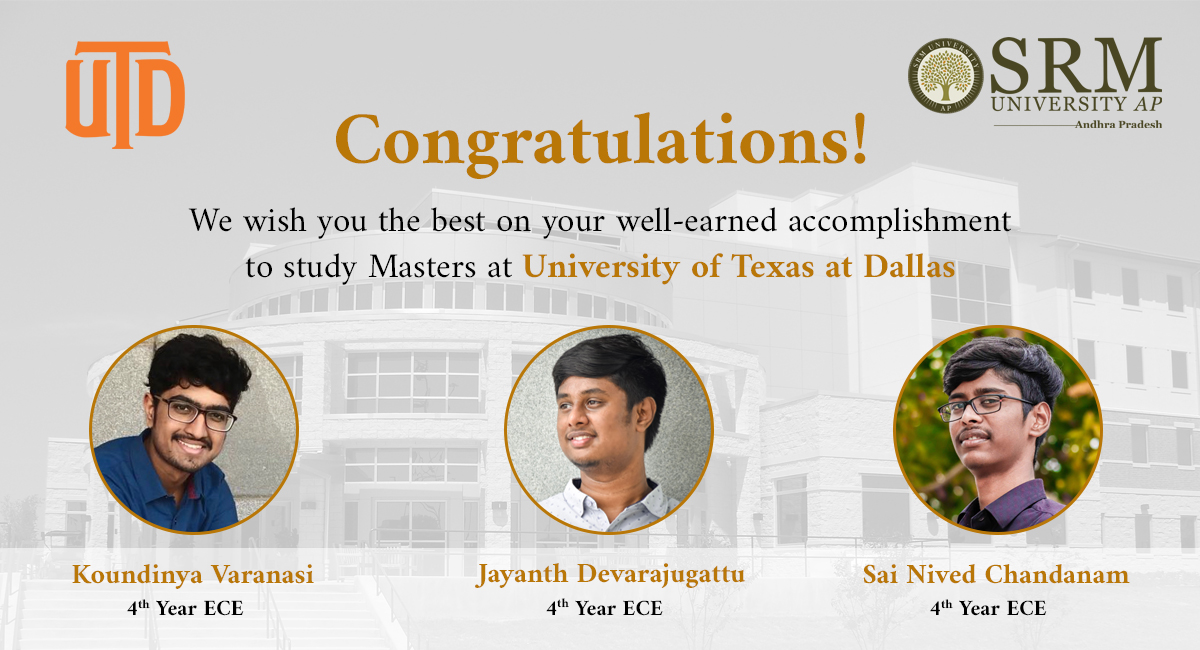 Pursuing higher education in universities of international repute is perhaps a long-cherished dream of every student. SRM University-AP has always been at the forefront in providing the right avenues for students to explore their inherent talents and in equipping them with the right skillset through educational practices and research programmes of global standard.
Pursuing higher education in universities of international repute is perhaps a long-cherished dream of every student. SRM University-AP has always been at the forefront in providing the right avenues for students to explore their inherent talents and in equipping them with the right skillset through educational practices and research programmes of global standard.It is an honour for SRM University-AP to announce that three of our students; Varanasi Koundinya, Sai Nived Chandanam and Jayanth Devarajugattu of the Department of Electronics and Communication Engineering have secured admission in the University of Texas at Dallas to the Master of Science in Computer Engineering programme for the Fall 2022 semester.
Exposure to state-of-the-art technological facilities and involvement in research-oriented pedagogical practices enable students to outperform in a world where technology is evolving at a rapid pace. Courses anchored in a multi-stream framework empower students to specialize across disciplines, thereby expanding their choice of higher studies in and outside the country.
In the words of Jayanth Devarajugattu, a strong collaboration of the university with international universities and industries across the globe have been of immense help to seize an opportunity for overseas education. He also marked his gratitude to the faculty members who have provided him with effective guidance throughout the research. “I am extremely grateful to Ramesh Vaddi sir, Siva Sankar sir, Anirban sir, Gangi Reddy sir for guiding us throughout the process by helping us choose the right university and issuing a letter of recommendation”, he said.
Associating with faculty members on various research projects will always offer new insights to students to think differently. “Dr Ranjit Thapa sir with his teaching and research work inspired me the most in pursuing my masters, I look up to him”, said Sai Nived.
All of them expressed their gratefulness to the university for endowing them with appropriate training which helped them maintain good grades, conduct research and publish papers. “Your CGPA and paper publications play a crucial role in making into an international university of your choice”, they mentioned.
The Inter-Disciplinary Experiential Active Learning (IDEAL) pioneered by SRM offers flexibility in course curriculum, thereby giving students the freedom of curating syllabus with respect to their interests and aspirations. Fostering an environment of academic freedom and prioritizing the interests of students in line with the demands of present times distinguish SRM University-AP as an emerging university of world-class standard. Working towards the dreams of students has always been the driving force behind the advancement of SRM University-AP.
- Security Framework using Blockchain Technology February 24, 2022
The Department of Computer Science Engineering is proud to announce that Dr Sriramulu Bojjagani has published a paper titled “Blockchain-Based Security Framework for Sharing Digital Images using Reversible Data Hiding and Encryption” in the journal Multimedia Tools and Applications (MTAP) having an impact factor of 2.757.
The paper is published in collaboration with D.R Denslin Brabin from the Department of Computer Science and Engineering, DMI College of Engineering, Tamil Nadu and Christo Ananth from the Department of Electronics and Communication Engineering, St. Mother Theresa Engineering College, Tamil Nadu.
Abstract of the Research
Security is an important issue in current and next-generation networks. Blockchain will be an appropriate technology for securely sharing information in next-generation networks. Digital images are the prime medium attacked by cyber attackers. In this paper, a blockchain-based security framework is proposed for sharing digital images in a multi-user environment. The proposed framework uses reversible data hiding and encryption as component techniques. A novel high-capacity reversible data hiding scheme is also proposed to protect digital images. Reversible data hiding in combination with encryption protects the confidentiality, integrity and authentication of digital images. In the proposed technique, the digital image is compressed first to create room for data hiding, then the user signature is embedded; afterwards, the whole image is encrypted. For compression, JPEG lossy compression is used to create high capacity. For encryption, any symmetric block cipher or stream cipher can be used. Experimental results show that the proposed blockchain-based framework provides high security and the proposed reversible data hiding scheme provides high capacity and image quality.

Fig 1: The process of encoding during reversible data hiding
Dr Sriramulu Bojjagani also intends to work on the development of block-chain based solutions to intelligent transport systems and on addressing the challenges of security issues involved in connected and autonomous vehicles.


